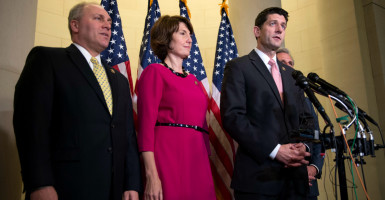For the first time, Congressional Republicans sent a bill repealing key provisions of President Barack Obama’s signature healthcare law to his desk.
Following the upper chamber’s lead, the House passed a reconciliation bill, 240-181, repealing measures of Obamacare and placing a one-year moratorium on federal funding for Planned Parenthood this evening. The Senate passed the same bill last month.
The legislation now heads to the White House, where the president will veto it.
>>> Scroll to the bottom to see how your member of Congress voted.
“We are confronting the president with the hard, honest truth: Obamacare doesn’t work. Higher premiums and fewer choices and restricted access—these are not signs of success,” House Speaker Paul Ryan, R-Wis., said during a press conference today. “Obamacare is not successful. They are the signs of failure. And the American people deserve better.”
Though House and Senate Republicans are well aware the legislation is dead-on-arrival once it gets to the White House, they say it forces the president to explain why he continues to support the law when many Americans face higher premiums and deductibles, and have been forced to choose new plans despite Obama’s assurances to the contrary.
“Any time that you make someone in elected office take a stance, it’s extremely valuable because the American people don’t watch too much until then,” Rep. Steve Pearce, R-N.M. told reporters at the monthly event Conversations with Conservatives today. He continued:
So [Obama] will absolutely say, ‘I refuse to understand that you as Americans are hurting because of this bill, that you’re losing your jobs, some of you have been cut back to part time … many of you now have lost the insurance that you’ve spent decades preparing for your family, and I, as the president of the United States, am going to tell you forget it, I’m going to veto it.’ I think that’s extraordinarily valuable in the political circumstances.
In using reconciliation to repeal the health care law, conservative lawmakers also say it sets the stage for 2017, when a new president and Congress can use today’s vote as the precedent for repealing Obamacare using reconciliation once again.
“This sets us up very well for the election,” Rep. Tim Huelskamp, R-Kan., said today, “but most importantly, in making certain that the strongest country in the world has the strongest health care system in the world that’s based on free-market principles, not just something put out by a bunch of bureaucrats and politicians in Washington, D.C.”
House Republicans have voted to repeal Obamacare more than 50 times, but the reconciliation bill passed last month marked the first time the Senate approved such legislation since the law’s implementation.
Reconciliation is a budget tool used in the Senate that allows a bill to pass with just 51 votes, avoiding a Democratic filibuster in the upper chamber.
The bill passed by the House today repeals the individual and employer mandates, Medicaid expansion, tax credits, medical device tax and Cadillac tax. It also strips the government of its authority to run Obamacare’s exchanges and lessens the fine for failing to comply with the mandates to $0.
The House passed a different version of the reconciliation bill in October, which left in place the Medicaid expansion and tax credits. The original legislation was met with skepticism from conservative senators, who originally said they couldn’t support a bill that left those provisions in place.
Not only did Republicans kick off 2016 with a vote to repeal Obamacare, Ryan promised last month his colleagues would unveil a plan to replace the health care law this year.
Conservatives view the reconciliation bill as a crucial step in reassuring the American people they are prepared to present them with an alternative.
“I think we want to make absolutely clear that Republicans in Congress have put together a plan to replace Obamacare. People are hurting,” Huelskamp said. “…We’ve voted dozens and dozens of times to repeal, and finally it’ll make his desk, and now it’s time to get to the hard work of setting the stage for actually fixing health care problems.”
See how your member of Congress voted on the bill below.



























